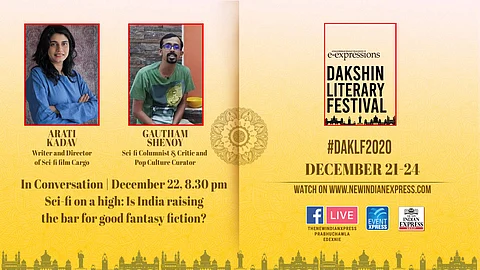

From finding a few Science Fiction books dumped in a corner of the bookstore to huge racks of them written by Indian authors, times have changed, said Gautham Shenoy, Sci-Fi writer. Gautham said, "Earlier, when you entered a bookstore, we would find a small section of Science Fiction books, almost as if it was an apology. But if you walk in the bookstores these days, you have a lot of books to read on the same genre. From books written by Issac Asimov, Arthur C Clarke, we now see a lot of Indian writers writing Science Fiction including Gautam Bhatia and Samit Basu. I call it a renaissance in Sci-Fi literature." He was in conversation with Arati Kadav, Writer and Director of the Cargo at the Dakshin Literary Fetival 2020.
Agreeing with him, Arati said things were looking up on the film front as well, "I struggled for more than seven years to produce Cargo. No producers were keen on producing a Science Fiction film. Four years ago, when I wrote an email to some of the more famous producers, they told me that films of any genre except Sci-Fi can be produced. Now, times have changed as people watch movies of all genres on OTT platforms. When I say that I have an idea for a Sci-Fi film, they make sure they listen to the idea."
The change, however, has been fast and palpable, she added, "However, with the change in opinion and times, people are coming forward to turn books into films. For instance, there are talks about turning Samit Basu's Turbulence into a movie. We are in the golden phase of watching and reading Science Fiction in India. While our writers add the element of originality, the readers can easily connect with the cultural and social element."
Gautham turned to how regional sensibilities and locales were getting a lot of play with a Sci-Fi twist to it. And the pandemic, work from home and increased OTT exposure has helped, "There was also a book called Analog Virtual, where the author highlights the future of Bengaluru and how virtual productivity has become the key to survive in the city. Unlike the producers in North India, who are a bit traditional and conservative, the producers in South India have produced movies like Android Kunjappan Ver 5.25. I agree that Sci-fi is high in India but it is yet to peak. Apart from Malayalam, there is also a new movie coming up in Kannada called Mysore Masala which people are looking forward to watching first day, first show in the living room." he said.
Arati also spoke about how Sci-Fi themes were moving out of typical American tropes and to the Far East, when she said, "Though there are new writers in the West, people are looking at Eastern narratives in Sci-Fi. While people can argue about Ted Chiang is an American writer, his sensibilities in the stories are true and connected to his roots in China."
Gautham agreed and added that this was the true mark of appreciation, "Science Fiction is the next big thing in the world. It will not take much time for India's Science Fiction to make it to the global market. In the last year, writers like Shivram Das and Nivedita Sen have been nominated for the Hugo and Nebula Awards. These nominations are kind of accelerating people's interest. The day is not far when Indian authors will win a Hugo or a Nebula or something gets turned into a global OTT series. It is not just a question of 'if' but 'when'."
